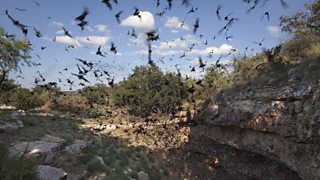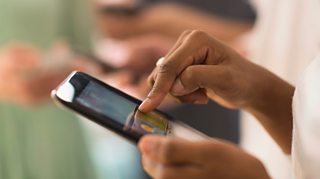How to tell a covidiot from a maskhole: learning the language of the pandemic
Back in February, nobody knew what blursday meant, and the word “quarantini” looked like a misprint. But when COVID-19 emerged and shook the world, the introduction of new words to our ever-expanding vocabulary came along with it.
In Radio 4’s Word Of Mouth Professor Tanya Byron discusses the language of COVID-19 with medical historian and author of The Pandemic Century, Mark Honigsbaum. Here are a few things we learnt about the language of the pandemic.

-
![]()
Word of Mouth: The Language of the Pandemic
Professor Tanya Byron examines the language of Covid-19 with author Mark Honigsbaum.
Epidemic or Pandemic: what’s the difference?
According to Honigsbaum, an epidemic is when a disease transmits above what is normal. A pandemic is when a new disease spreads in two or more regions at the same time – encompassing a wide number of people, or even the world.
Kangaroo words are where you take out some letters from a word to create a synonym. One of the most prominent right now is: pandemic = panic.
Kangaroo words:
These are nothing to do with marsupials. They occur when you take out some letters from a word to create a synonym. One of the most prominent right now is “pandemic = panic”.
The issue with labelling
Yes we love a good label, especially in the office fridge (oh, the nostalgia). But not all labels are for the best. Honigsbaum discussed the damaging implications that can occur with labels.
What first struck him about the way we spoke about COVID-19? “The sense of disbelief and denial…once people did start to realise it was serious, there was an attempt to say oh it’s the Wuhan virus or as Donald Trump said, it’s the China virus, an attempt to say it’s over there - it’s ‘their’ and not ‘our’ problem.” Klung Flu, anyone?

The origins of words
A lot of words that are new to the general public – in particular those to do with epidemiology - are not new to those in specialist areas. Here are the most common ones we now use:
Herd Immunity: the resistance of a certain virus to spread if a high enough proportion of the population are immune to it. Usually this is the case with vaccines; with COVID-19 it’s the case when enough people get the disease.
Furlough: a military word, often used when a soldier goes away on leave.
Super spreader: this is not an epidemiological word but one that has entered the mainstream through the media, according to Honigsbaum. This term isolates an individual and rids him or her from a “sense of collective responsibility” according to Professor Tanya.
Social-distancing: can be hard to understand. Are we talking three metres or one?

How will restaurants change after the lockdown
Does the future mean fewer tables, staff in masks and gloves and iPad ordering only?
New words for new times
One of the best things about the British is our sense of humour and our ability to make light of the most dire of situations. We take a look at some of our favourite plays on words during Covid-19…
Blursday: when all the days blur into one another and you’re not sure if it’s Sunday or Thursday
Quarantinini: what started off as a concoction of Vitamin D, orange juice and vodka for an immune-building drink, is now just any cocktail you drink during lockdown
Loxit: the exiting from lockdown and its rules

Lockstalgia (Times): we may look back fondly upon the time of lockdown and save up stories to tell our grandchildren

Rona: American rapper Cardi B coined this phrase in a video that quickly went viral online
Covidiot: someone who is behaving irresponsibly or flouting government instructions in the face of the virus
Morona: a person behaving like an imbecile directly because of the outbreak
Coronalusional: suffering from disordered thinking as a result of, or during, the COVID-19 crisis
Doomscrolling: scrolling through social media and seeing a continuous stream of doom and gloom
Zumped: ‘dumped’ by a partner via video link [] or online
Ronavation: renovation or refurbishment during lockdown; an hashtag
Quaran-stream: binge-watching several TV series and/or movies while in lockdown
Spendemic: the increase in online shopping while confined during the coronavirus
Maskhole: someone refusing to wear a mask despite notices being in place

More from Radio 4
-
![]()
Word of Mouth: The Language of the Pandemic
Professor Tanya Byron examines the language of Covid-19 with author Mark Honigsbaum.
-
![]()
The psychological impact of coronavirus
12 things we learned about coping with Covid-19 and life in lockdown.
-
![]()
The Virus Hunters: heroes racing to extinguish new pathogens
The unending quest to track down viruses which could mutate and infect us at any time.
-
![]()
Shopping after lockdown: what will change?
Has the pandemic heralded a whole new approach to spending?




